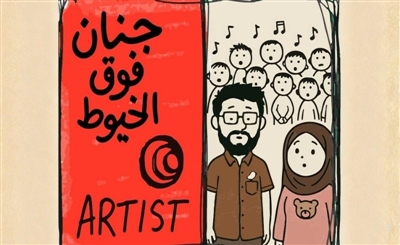Lebanese Shoegaze Outfit Ilvy Dive Into Ever Darker Territories On Debut Album China Girl
Despite lineup changes and a slight shift in direction, Ilvy’s first record is a cohesive and deeply personal reflection on the current state of Lebanon

The Lebanese post-punk/shoegaze outfit, comprised of Paul Toubia and Anthony Hakim on electric guitars, Gerard Rechdan on vocals and drums, and Joe Kareh on vocals, bass, and synthesizers, released their debut album China Girl on October 1st, following up a sparse handful of tracks on Soundcloud and many weeks of anticipation.
In a simpler world where one could look at a piece of music without taking into consideration the circumstances of its creation, it could be easy to naively dismiss China Girl as just another depressive, angsty post-punk record. However, context is essential in understanding the emotional core of what China Girl is and what it attempts to convey.
Ilvy’s debut is an incredibly personal project, channeling an intense lived experience of current day Beirut through a grim outlook on a society where personal expression is beaten down by the system, and where hope is a luxury in the face of economic calamity, mass displacement, and an egregious loss of human life that remains to be answered for.
Recorded and mixed live (albeit with some overdubs) at Beirut’s Tunefork Studios with Fadi Tabbal — a central figure in relief effort for many of Beirut’s musicians who lost their homes and studios in the August 4th explosion — China Girl conveys a tangible grit and heaviness through it’s instrumentals, undoubtedly shaped by Lebanon’s increasingly dire political and economic situations.
The predominantly instrumental album blends moments of tenderness, punctuated by delicate guitar arpeggios, with massive overblown ambient soundscapes and descents into abyssal doom-jazz, heard most prominently on the fourth track ‘44°16′50″N 6°26′20″E’. Vocals are few and far between, with the first words appearing nearly 20-minutes into the album’s runtime, and even so Joe Kareh and Gerard Rechdan keep things very brief and succinct through repeated poetic segments at numerous key points during the album, detailing an intense yearning for a sense of freedom that always seems just out of reach for the Lebanese people.
Notably Absent from the record is any sense of overindulgence, and China Girl is for the most part instrumentally reserved and tastefully assembled, despite often building into cacophonous walls of sound. On the lyrical side of things, Ilvy don’t wax poetic about Beirut’s current situation, nor are there pop-tinged choruses or smugly delivered political innuendos to dilute the concentrated emotions being conveyed. Much of what makes China Girl tick is implicit, obscured, and delivered with maturity and respect. Hidden amongst the track titles are references to plane crashes, fentanyl, and trauma, though these motifs will only become apparent to more curious listeners willing to go a bit more in depth.
To be honest, there’s no clip or snippet of ‘China Girl’ that can really do the project proper justice, and taking any segment out of context would be a disservice to the intent and message of the album. Ilvy’s China Girl is best listened in one go — no skips or fast-forwards — and with the volume cranked way up.
<iframe style="border: 0; width: 400px; height: 307px;" src="https://bandcamp.com/EmbeddedPlayer/album=2406632835/size=large/bgcol=ffffff/linkcol=0687f5/artwork=small/transparent=true/" seamless><a href="https://ilvy.bandcamp.com/album/china-girl">China Girl by Ilvy</a></iframe>
The following excerpt from Ilvy’s Bandcamp description for China Girl — worth a full read in it’s own right — perfectly encapsulates the core tenets of the project:
“Coming from a city controlled by warlords, our society is facing never-ending social anxiety that has dealt with past and present trauma still lurking between us.
We feel the urge to breathe, let go, co-exist, understand, and forgive, but our future comes down to a ticking clock that moves backward as we try to move forward. Truly, a depiction of learned helplessness that thrives on a cycle of resiliency and regression where we can ask ourselves “How long?”
Listen to Ilvy on Soundcloud, Bandcamp
Follow Ilvy on Facebook and InstagramTrending This Month
-
Nov 24, 2025






















